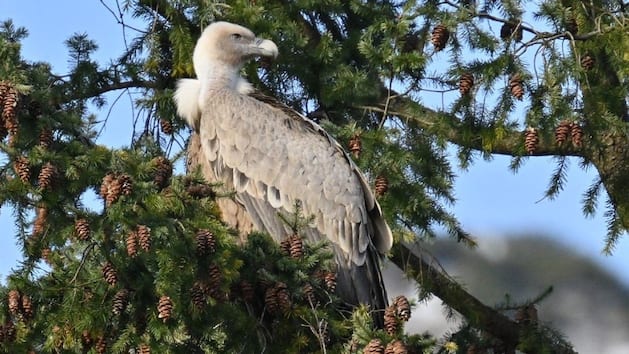For the second time in winter 2022/23, a rare griffon vulture (Gyps fulvus) ventured to Bavaria, reports the Bavarian State Association for Bird Protection (LBV) on its website. After one of the birds of prey was reported in the Lindau district in December, an animal is now roaming the area around Bad Reichenhall.
Such sightings are not entirely uncommon there, as griffon vultures from a semi-wild colony from the Salzburg Zoo keep flying in.
But in contrast to these conspecifics, the current visitor is not marked and therefore comes from a different region.
“The griffon vulture near Bad Reichenhall probably comes from south-eastern Europe, for example from Friuli in Italy or Croatia. There are larger stocks there, of which we know from the transmitters and ringing of individual birds that they regularly fly to the north-eastern Alps,” says Toni Wegscheider from the LBV.
Young birds in particular can roam far and wide. According to Wegscheider, the griffon vulture from Bad Reichenhall also appears well fed and fit.
“On the surrounding mountains he can find enough offal from hunted game. Thanks to the large areas of the Bavarian State Forests, these should also be largely lead-free, since lead ammunition, which is highly toxic to birds of prey, can no longer be used there,” says Wegscheider.
The griffon vulture gains enough energy from its food to be able to fly in what is known as a rowing flight, even when the thermals are weak in winter. In warm months, the animals can cover very large distances in energy-saving gliding flight thanks to rising air masses.
In recent years, griffon vultures have repeatedly flown into Central Europe, where they have been extinct for centuries. On the one hand, this is due to successful resettlement projects such as in France, from where young animals migrate. In 2006 and 2007, however, hunger drove large numbers of vultures to Germany.
At that time, the European Union had decided that no more cadavers of cattle or horses should remain in nature due to epidemics. In Spain, even specially designated storage areas were no longer stocked with dead animals, some of which had previously served as a kind of “vulture resting place” for decades.
The numerous vultures in the southern European country were therefore forced to migrate in search of food, reaching as far as Germany. In the meantime, the practice there is allowed again.
There are no such places for carcasses in Germany and carrion is quickly removed from the environment, which also harms numerous other species. Scientific studies are now underway, but outside of the mountains, carcasses in sufficient quantities will probably remain rare for a long time.
The LBV, together with various partners, is currently also hunting bearded vultures near the entry point near Bad Reichenhall. They used to be native to the Alps as well, but were then almost completely wiped out.
Griffon and bearded vultures do not compete for food, as the bearded vulture mainly uses the bones of dead animals, while the griffon vultures prefer rotting meat.
The original of this article “Rare vulture surprisingly discovered in Bavaria, expert suspects origin” comes from Spektrum.de.
